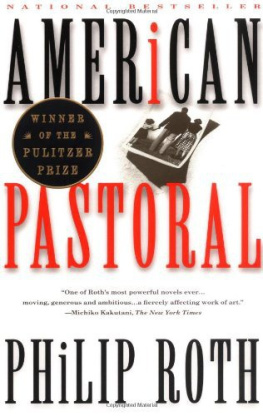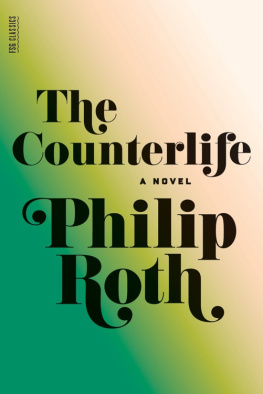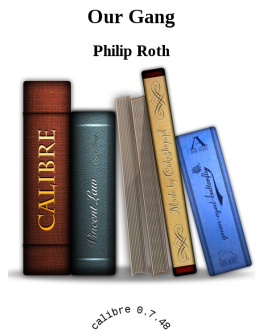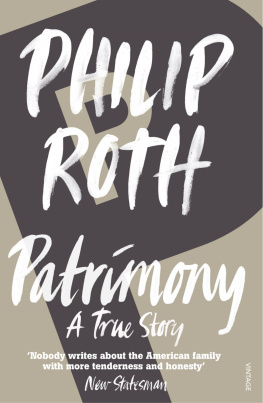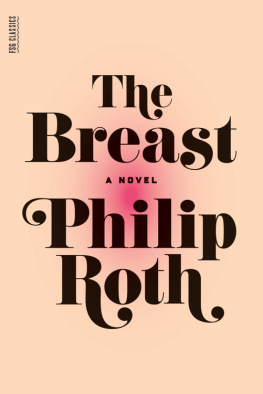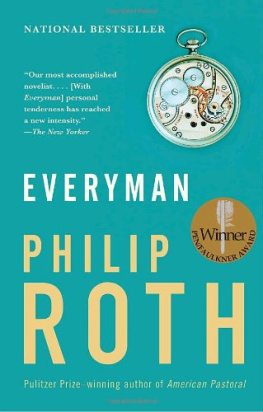Well, What
Do You Think?
My father had lost most of the sight in his right eye by the time hed reached eighty-six, but otherwise he seemed in phenomenal health for a man his age when he came down with what the Florida doctor diagnosed, incorrectly, as Bells palsy, a viral infection that causes paralysis, usually temporary, to one side of the face.
The paralysis appeared, out of nowhere, the day after he had flown from New Jersey to West Palm Beach to spend the winter months sharing a sublet apartment with a retired bookkeeper of seventy, Lillian Beloff, who lived upstairs from him in Elizabeth and with whom he had become romantically involved a year after my mother died in 1981. At the West Palm airport, he had been feeling so fit that he hadnt even bothered with a porter (whom, besides, he would have had to tip) and carried his own luggage from the baggage area all the way out to the taxi stands. Then the next morning, in the bathroom mirror, he saw that half his face was no longer his. What had looked like him the day before now looked like nobodythe lower lid of the bad eye bagged downward, revealing the lids inner lining, the cheek on that side had gone slack and lifeless as though beneath the bone had been filleted, and his lips were no longer straight but drawn down diagonally across his face.
With his hand he pushed the right cheek back to where it had been the night before, holding it there for the count of ten. He did this repeatedly that morningand every day thereafterbut when he let go, it wouldnt stay. He tried to tell himself that he had lain the wrong way in bed, that his skin was simply furrowed from sleep, but what he believed was that hed had a stroke. His father had been crippled by a stroke back in the early 1940s, and once hed become an old man himself, he said to me several times, I dont want to go the way he did. I dont want to lie there like that. Thats my worst fear. He told me how he used to stop off to see his father at the hospital early in the morning on the way downtown to the office and again on his way home at night. Twice a day he lit cigarettes and stuck them in his fathers mouth for him and in the evening he sat beside the bed and read to him from the Yiddish paper. Immobilized and helpless, with only his cigarettes to soothe him, Sender Roth lingered for almost a year, and until a second stroke finished him off late one night in 1942, my father, twice each day, sat and watched him die.
The doctor who told my father that he had Bells palsy assured him that in a short time most, if not all, of the facial paralysis would be gone. And within days of his getting this prognosis, it was confirmed for him by three different people, in just his section of the vast condominium development, whod had the same ailment and recovered. One of them had had to wait for nearly four months, but eventually the paralysis went away as mysteriously as it had come.
His didnt go away.
He soon couldnt hear out of his right ear. The Florida doctor examined the ear and measured the hearing loss, but told him it had nothing to do with the Bells palsy. It was just something that happened with agehe had probably been losing the hearing in the right ear as gradually as he had lost the sight in the right eye and only now had noticed it. This time when my father asked how much longer the doctor thought hed have to wait before the Bells palsy disappeared, the doctor told him that in cases that continued as long as his had, it sometimes never disappeared. Look, count your blessings, the doctor said; except for a blind eye, a deaf ear, and a half-paralyzed face, he was as healthy as a man twenty years younger.
When I phoned each Sunday, I could hear that as a consequence of the drooping mouth, his speech had become slurred and difficult to followhe sounded at times like someone fresh from the dental chair whose novocaine hadnt worn off; when I flew to Florida to see him, I was startled to find him looking as though he might not be able to speak at all.
Well, he said, in the lobby of my hotel, where I was meeting Lil and him for dinner, what do you think? Those were his first words, even as I bent over to kiss him. He was sunk down beside Lil in a tapestried love seat, but his face was aimed straight up at me so that I could see what had happened. Over the last year he had intermittently been wearing a black patch over his blind eye to prevent the light and the wind from irritating it, and what with the eye patch, the cheek, the mouth, and the fact that he had lost a lot of weight, he seemed to me gruesomely transformedin the five weeks since Id last seen him in Elizabethinto an enfeebled old man. It was hard to believe that only some six years earlier, the winter after my mothers death, when he was sharing the Bal Harbour apartment of his old friend Bill Weber, hed had no difficulty convincing the wealthy widows in the buildingwhod immediately begun to swarm with interest around the gregarious new widower in the fresh seersucker jacket and pastel trousersthat he had only just reached seventy, even though we had all gathered together to mark his eightieth birthday the summer before in my house in Connecticut.
At dinner in the hotel I began to understand how much of a handicap the Bells palsy was, in addition to being disfiguring. He could now drink successfully only by using a straw; otherwise the liquid ran out the paralyzed half of his mouth. And eating was a bite-by-bite effort, laden with frustration and embarrassment. Reluctantly he agreed, after spotting his tie with his soup, to allow Lil to wrap a napkin around his neckthere was already a napkin across his lap, more or less protecting his trousers. Occasionally Lil reached over with her own napkin and, to his disgruntlement, removed a piece of food that had slipped out of his mouth and adhered to his chin without his knowing it. Several times she reminded him to put less food on his fork and to try, with each bite, to take into his mouth a little less than he was accustomed to. Yeah, he mumbled, staring disconsolately into his plate, yeah, sure, and after two or three bites he forgot. It was because eating had become a depressing ordeal that he had lost all this weight and looked so pathetically undernourished.
What made everything still more difficult was that cataracts in both his eyes had thickened in recent months, so that even the sight in his one good eye had grown blurry. For several years my ophthalmologist in New York, David Krohn, had been following the progress of my fathers cataracts and dealing with his deteriorating vision, and when, in March, my father returned to New Jersey from his unhappy stay in Florida, he went to New York to urge David to remove the cataract from the good eye; because he was powerless to do anything about the Bells palsy, he was particularly eager that some action be taken toward restoring his sight. But late in the afternoon following my fathers visit, David phoned to say that he was reluctant to operate on the eye until further tests had determined the cause of the facial paralysis and the hearing loss. He wasnt convinced that it was Bells palsy.
He was right not to be. Harold Wasserman, my fathers New Jersey physician, had arranged locally for the MRI scan that David ordered, and when Harold received the report from the lab, he called me early that evening to give me the results. My father had a brain tumor, a massive tumor, Harold called it, and though with MRI pictures one couldnt distinguish between a benign and a malignant tumor, Harold said, Either way, those tumors kill you. The next step was to consult with a neurosurgeon, to determine precisely the kind of tumor it was and what, if anything, might be done. Im not optimistic, Harold said, and neither should you be.
I managed to get my father to the neurosurgeon without telling him what the MRI had already disclosed. I lied and said that the tests showed nothing, but that David, being extra cautious, wanted to get one last opinion on the facial paralysis before he went ahead with the cataract removal. In the meantime, I arranged for the MRI pictures to be sent to the Essex House Hotel in New York. Claire Bloom and I were temporarily living there while we were looking for an apartmentwe were planning to find a place in Manhattan after ten years of dividing our lives between her house in London and mine in Connecticut.
Next page

